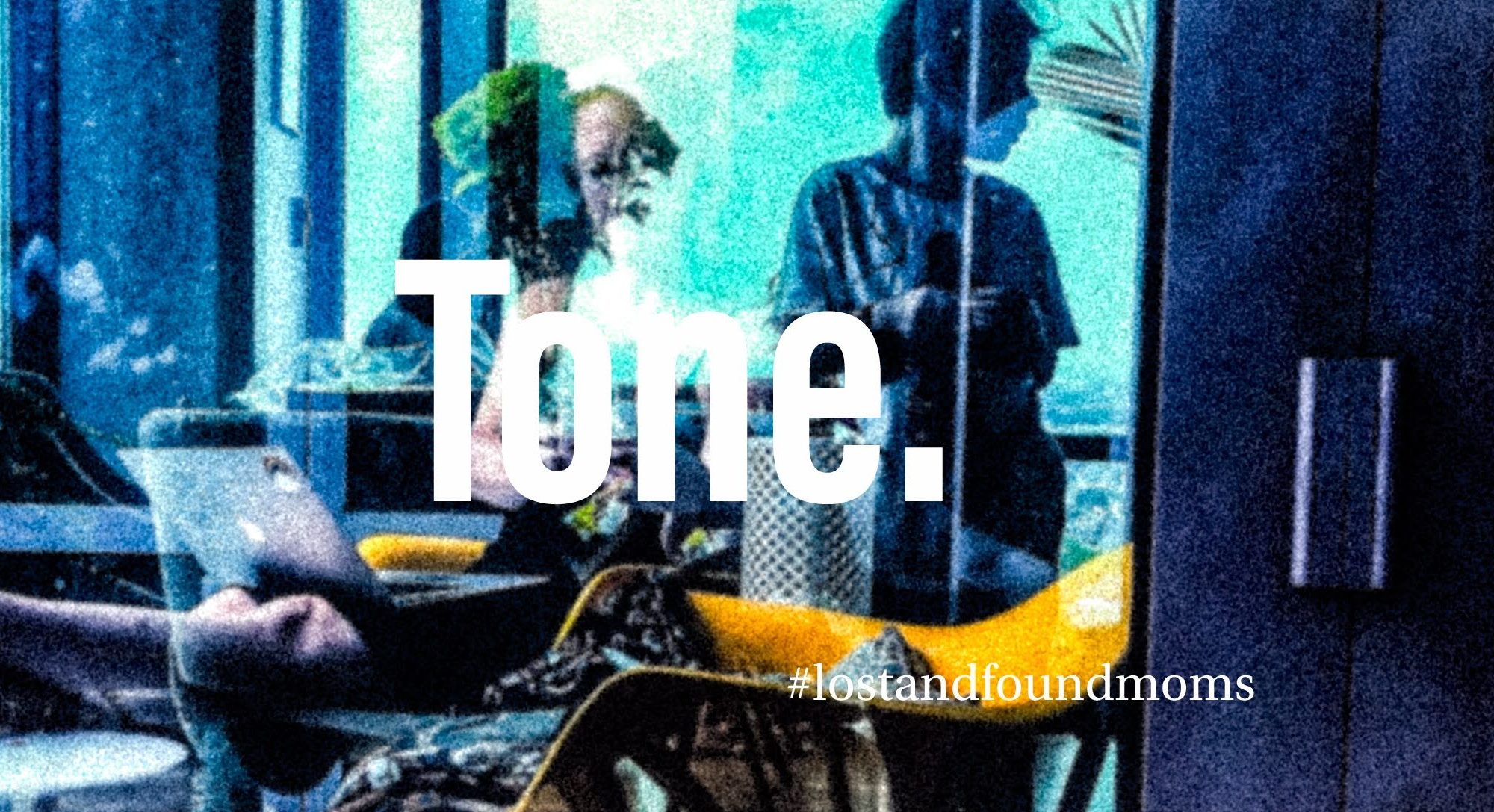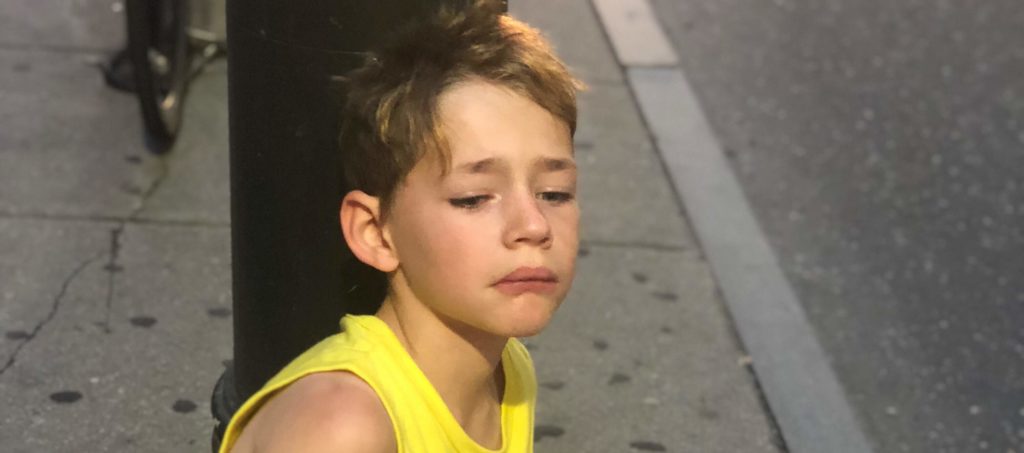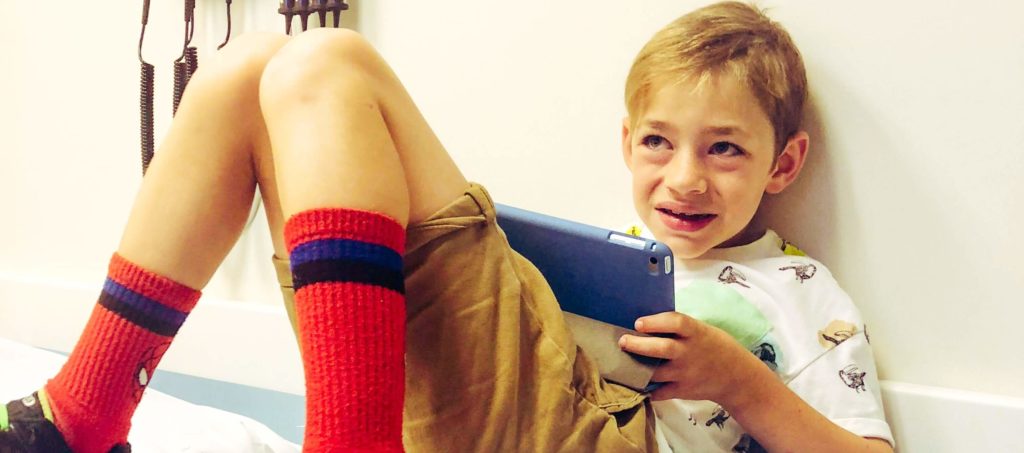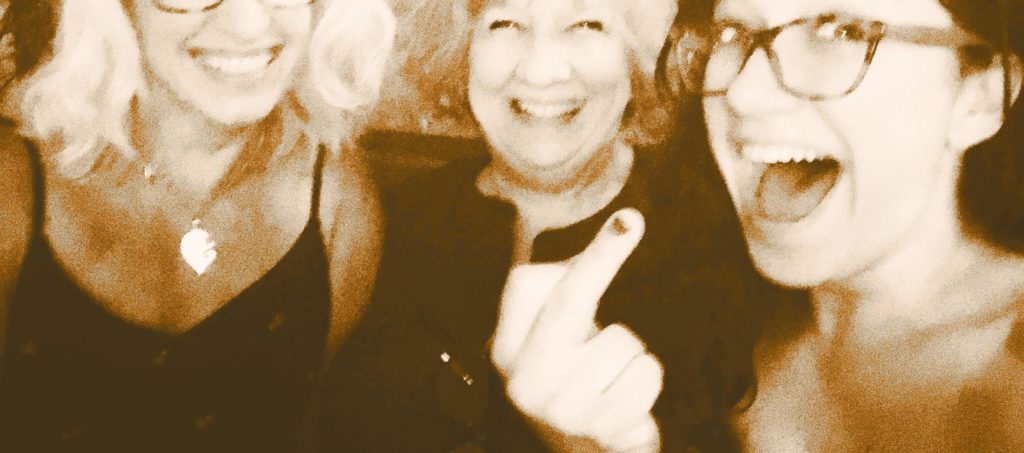*This script is based on real-life events from the year 2018
Int. Neurologist Office – Day
Morning Appointment with Kerri, Dave, and Mitchell to discuss Mitchell’s seizures and increased behavior/emotional outbursts. The office is new and brightly lit. It is clean with a mural of a child in a tiger costume playing in the grass covering the wall above the chairs for parents. The energy is quiet and tense. Kerri and Dave sit in chairs facing the door, waiting for the doctor. Kerri is lost in space picking her lips, and Dave is on his phone. Mitchell sits on the checkup table slumped against the wall with his IPad.
The Doctor enters. Kerri stands to hug her. Dave looks up and smiles. Mitchell barely says hello.
Cut to the end of the appointment. Close up on Kerri and Doctor who are standing close together by the door. Dave is in shadow behind Kerri. We do not see Mitchell. Kerri is upset, frustrated, and scared. The appointment has provided no answers to Mitchell’s worsening condition. We see Kerri’s shoulders slump and her body droop. Kerri has just, once again, told the doctor that Mitchell can’t even get out the door without a meltdown, that he’s not living a “real” life and she doesn’t know what to do, that she is “losing” it.
DOCTOR
Kerri, you should not be getting him ready for the day, you shouldn’t even be getting him dressed.
KERRI
What do you mean? I’m his mom. That’s literally my job.
DOCTOR
Yes, you’re his mom. But right now your job should only be to love him. You should not be helping him with homework, and you should definitely not be the disciplinarian,
KERRI
(Dead Silent, then stuttering, then shaking, suddenly silent again with tears beginning to escape down her cheeks.)
I don’t even know what that means? That’s not real life. Dave has to work, or we have no health insurance. I’m it, and I’m supposed to be able to do this. How is he going to live a “real” life? He can’t function, He’s coming apart at the seems. And it’s tearing him apart too. It’s my job to make sure he’s OK! He can’t live like this, what’s going to happen to him?! We can’t live like this? How do I do this?
DOCTOR
Take care of yourself so you can be what he needs you to be right now. Just love him. And maybe right now, you’re asking too much of him and yourself. It’s not your job to save him.
KERRI
That’s exactly my job. I’m his mother! He hates me. He’s sad all the time. And these…episodes?! He has to learn that it’s not OK to be mean and violent, no matter what he’s feeling. But he can’t control it, and no one knows what’s causing it. Is this just him now? He hates me, and we’re both at each other all the time.
(Breaking for a second)
I have to help him. I want him to love me again. He gets further away from me every day. I want my little boy back!
DOCTOR
I know. But you can only take so much, Kerri.
KERRI
What if this gets worse? What if he grows up and hurts himself? I have to prevent that! (closed mouthed suppressed sobbing) If he’s not OK, then what the hell do I matter? I can’t take care of myself until I take care of him. That’s what I supposed to do, take care of him! (voice rises in desperation) He still needs to be a kid; He has no life. But he needs to go to school! If he falls too far behind, he’ll never catch up. And this behavior! (throws hands up in frustration and panic.)
DOCTOR
(With tremendous kindness but also firm. )
Kerri, this is happening. You have a very sick child, and all we can do right now is go through the process.
(puts hands up in a sign of making peace)
I know we’ve been through this before, but we have to keep trying. Daily life routines will help, but you shouldn’t be the one to put them in place, Kerri, he can only do what he can do right now, and so can you. It’s too much, and if you fall apart the whole ship goes down!
KERRI
(Hopeless and angry. Feeling faint and weak, but at the same time feels like shoving the doctor. Speaks in a low raw whisper.)
It’s my job to teach him to become a functioning person! I can’t work, I don’t have a life. This is the only thing I’m supposed to be doing, and I’m failing!! I’m failing my little boy. He’s so sick!
(fully sobbing)
It shouldn’t be that hard to get through the day. I’m his mother!
DOCTOR
So be his mom and love him. Take care of yourself so you can be there for him through this. We don’t know how, but it will change. Nothing stays the same forever. Get someone to help you! You can’t be head of the house and be his mom right now. They aren’t the same job. Be his mom and love him. Let someone else be his caretaker and help take care of you too.
KERRI
(Silent. Head Down. Crying. Defeated)
END SCENE:
Except, it wasn’t a scene. It was real.
I don’t remember leaving that appointment. I don’t’ remember what tests or referrals we got or what else we discussed. I don’t know what Mitchell was wearing or where he was when his doctor and I had this conversation. I know Dave was there, but I don’t remember that either.
I do remember my mom was in town because it was Thanksgiving weekend. I do remember thinking about how much I wanted a regular holiday weekend like a regular family and feeling resentful that one of my favorite holidays was being ruined by epilepsy and my inability to cope. I remember feeling frenzied trying so hard to force the festivities, and exhausted from the futility of it all. I remember Mitchell having his bazillionth “wonky place” episode as we were getting ready to go the Thanksgiving Day Parade. He was hitting me and yelling and telling me he wanted a new mother, among other horrible things. Buddha was not himself; hadn’t been for months. I remember wondering if the Mitchell we knew and loved might be gone for good this time; if he could ever come back. Between the meds and the seizures and everything else, there was never an answer. It’s always just trial and error, and I remember wanting to scream at the sky, or anyone for that matter, just to give me an answer. One way or another, I needed an answer. The fear was killing me. The pain was too much.
I remember thinking, This is it, this is our life now. It had already been months of this, just me and Buddha going round and round between seizures and fights, and tears. I remember sitting down in his little blue beanbag chair under the grey loft bed we had no business buying him, totally defeated. I remember the physical feeling of not being able to get up from that chair for hours. I remember crying and feeling empty and stuck. I remember the family leaving for the parade and then coming back and me still in the same beanbag chair feeling as if no time at all had passed. I remember my mom saying that if I didn’t get someone to help me with Mitchell, she would see about getting me into a hospital.
I remember breaking.
And then, I remember thinking I would die before I would let anyone take me from my son. The thing is, I wasn’t sure I could do it. I wasn’t sure I could be what he needed me to be. I wasn’t sure I was strong enough to be his mom.
But thank God, I wasn’t alone even if that’s how I felt.
A few weeks later, I remember Dave found Alex and I agreed to see yet another therapist.
That was the day; things began to change again. But this time towards self-care and healing instead of defeat.
Alex came in to get him ready, keep him fed, and do my dishes. She helped him with homework and created a routine and point system for every action of his day, including a cooldown system for his wonky place episodes. She was the one who encouraged him to name the episodes, and that’s what he liked “wonky place.” Before then, it was just terror and aggression. We didn’t know what to call them.
I remember crying alone in my room…alot…for weeks, as Alex got him to do things I never could.
I remember Mitchell’s breaking point in February when we finally had him admitted because of his erratic, aggressive behaviors. We were at Lucky Strike, and he didn’t want to leave. After screaming in front of everyone, running away and almost out into the street, it took two of us 20 minutes of holding him down to get him into the cab and to the ER. We were finally admitted, and they were beginning to talk about some pretty severe measures. I remember being so deeply scared. I remember him crying. He was sad, and sorry and angry and so so very lost.
I remember feeling a little bit more able to handle the situation.
That’s when we pulled him off the latest med even though his seizure control was the best it had ever been. I remember deciding to give him a better quality of life over his improved physical health. I remember the weight of that decision but knowing it was the lesser of two evils and what we had to do. I remember the seizures ramping up full force all over again.
I remember being better able to handle the situation. I remember slowly letting Alex bare the brunt of the bad times so I could finally be the good guy.
I remember trying so hard, through so much pain, to accept the help I needed so that I could be the mom Buddha deserved. I remember all of a sudden having time and emotional space to concentrate on working through my fears and control issues.
I remember realizing how much of a toll this was taking on my husband and that he needed me too. My poor husband was a shell of himself at that point. He had a new job and needed to focus on that, and he was trying to be there for me. I realized we both had to be well to be there for each other. And so I let go a little more while Alex worked on Mitchell and my therapist helped me begin to process the trauma and grief. I was starting to accept compassion from my friends. I began to take care of me. And slowly, I began to like the way it felt to take care of me. I wasn’t feeling as guilty for what I couldn’t do, but grateful for what I could. I once again began to feel grateful to be Mitchell’s mom instead of fearful that I was the last thing he needed.
Then, all of a sudden, it was summer, and I remember feeling a little relief. I was relishing the happy, and I was feeling gratitude and love. I remember so many fun days from that summer. Fun days that were still interrupted with wonky place times, but were manageable. Or rather, I remember feeling like they were more manageable because I was stronger in myself. I remember the first time I didn’t have a big emotional reaction to one of his episodes and could walk through the steps with him calmly. I remember Alex standing up for me. I remember getting a little more sleep. I remember the warmth of the sun on my face and more peace in my heart. I began to feel proud of myself as a mom.
We got to be OK with defining a new normal, and I had more and more strength to be what Mitchell needed me to be. I wasn’t just recovering from my break, but I was building myself up stronger than before, more confident than before.
I remember beginning to get more snuggles and focusing on the love and connection rather than the daily charts and behavior control. I remember thinking how hard this was but how blessed I was (and am) to have this amazing, brave, loving boy, and to be his mother.
I remember Mitchell being happy and feeling proud too. And what a boost that was!!
I remember starting to work out again, and I remember the day I woke up and didn’t dread what the day might bring. I remember the day Alex and I started Lost and Found Moms and my amazement that I could not only be Mitchell’s mom but work again too. I remember Dave and I started going on date nights. We even spent the night away without Mitchell, over a year later, of course, but we did. It was the first time since before Mitchell was diagnosed that we had done that. And I remember sleeping like I hadn’t in years…and not feeling scared or guilty.
I remember starting to forgive myself for not being able to save my son. And I remember Mitchell being able to look at me with brighter eyes and telling me he loved me.
It was a very long year, but I made it through stronger than ever, and Mitchell did too. I remember feeling like I wasn’t failing at being his mom. It felt like I was beginning to let go of some of the control I needed to have all the time, the control I thought I needed to have to save my son, and I remember feeling more able to go through the changes of this crazy life with more acceptance and gratitude.
I remember telling Mitchell, “Buddha, I love you more than anything,” and him saying it back!
END
*This was, of course, not the end, but a moment in time. The moral of this play for me is to remember that accepting help is not a weakness, but a sign of strength. That I am more able to be the person, the parent, I want to be when I accept what I can and can not do. And that I am the mom Mitchell needs me to be, because I will never give up on him…or me.











